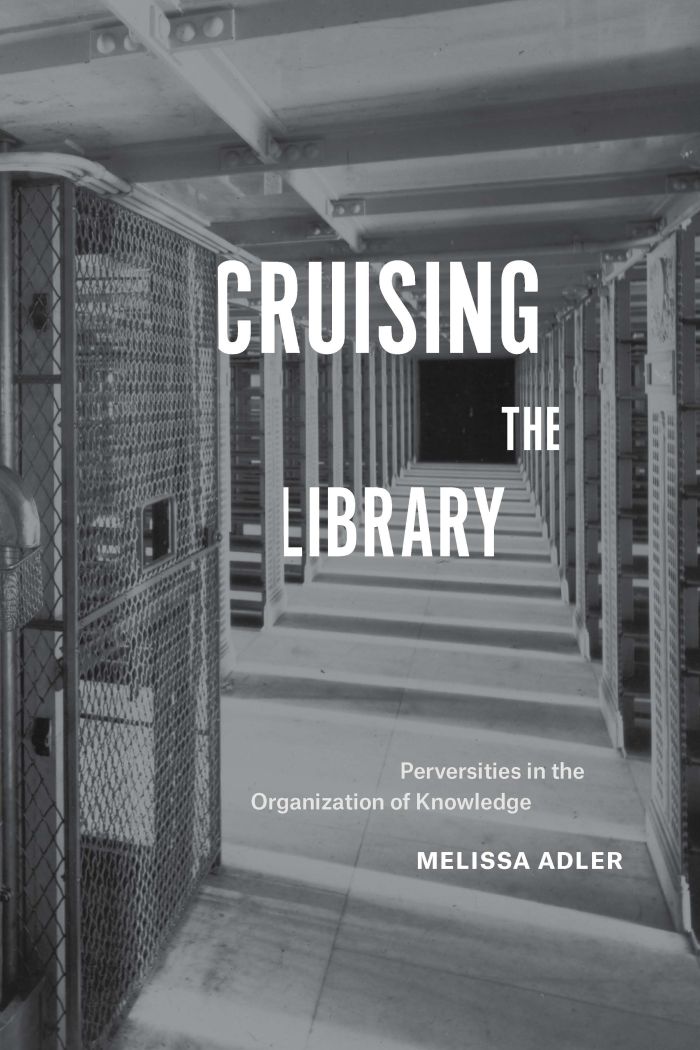Cruising the Library
Perversities in the Organization of Knowledge

This book can be opened with

Cruising the Library offers a highly innovative analysis of the history of sexuality and categories of sexual perversion through a critical examination of the Library of Congress and its cataloging practices. Taking the publication of Eve Kosofsky Sedgwick’s Epistemologies of the Closet as emblematic of the Library’s inability to account for sexual difference, Melissa Adler embarks upon a detailed critique of how cataloging systems have delimited and proscribed expressions of gender, sexuality, ethnicity, and race in a manner that mirrors psychiatric and sociological attempts to pathologize non-normative sexual practices and civil subjects.
Taking up a parallel analysis, Adler utilizes Roderick A. Ferguson’s Aberrations in Black as another example of how the Library of Congress fails to account for, and thereby “buries,” difference. She examines the physical space of the Library as one that encourages forms of governmentality as theorized by Michel Foucault while also allowing for its utopian possibilities. Finally, she offers a brief but highly illuminating history of the Delta Collection. Likely established before the turn of the twentieth century and active until its gradual dissolution in the 1960s, the Delta Collection was a secret archive within the Library of Congress that housed materials confiscated by the United States Post Office and other federal agencies. These were materials deemed too obscene for public dissemination or general access. Adler reveals how the Delta Collection was used to regulate difference and squelch dissent in the McCarthy era while also linking it to evolving understandings of so-called perversion in the scientific study of sexual difference.
Sophisticated, engrossing, and highly readable, Cruising the Library provides us with a critical understanding of library science, an alternative view of discourses around the history of sexuality, and an analysis of the relationship between governmentality and the cataloging of research and information—as well as categories of difference—in American culture.
“An original study on an old institution— the U.S. Library of Congress. Adler’s reading of crucial and cultural theory are accurate and insightful. She presents a practical example of the philosophical power of library documentation as a tool of metaphysics and political economy.”——Ronald E. Day, author of Indexing It All: The Subject in the Age of Documentation, Information, and Data
Tailor-made for the critlib movement, this demonstration that the Library of Congress is not a neutral space begs one critical question: where should it be shelved?
This compelling book should be read by everyone who cares about the complex politics of knowledge production and dissemination. Melissa Adler’s highly readable account of the fate of queer, non-normative sexual knowledge within the Library of Congress is both startling and important. It speaks to the very real importance of libraries and librarians to contemporary intellectual life.——Janice Radway, Northwestern University
In this rewarding study, Melissa Adler shows how systems used to classify and catalogue information for libraries operate as mechanisms of control. In particular, she focuses on the ways sexual identities are constructed and disciplined through library practices. Using Eve Sedgwick’s work as a paradigmatic test case, and the Library of Congress as a site, including its infamous Delta Collection, she produces a study that is as compelling as it is far-reaching in its implications. A must-read for present and future professionals, but also, a useful text for anyone concerned with official instruments for the production of knowledge.——Johanna Drucker, Breslauer Professor, Information Studies, UCLA
In Cruising the Library, Melissa Adler places the systems and structures of library organizational schemes at the center of the production of gender and sexuality in the United States. For Adler, library shelves are not merely rows of books, but formations that, like other political, social, and economic systems, govern and discipline gendered and sexed ways of being... Adler reads the library as a site for cruising, reading across and against the hegemonic story of sexuality told by the library to find the frisson at the limit. Read perversely, suggests Adler, the library can be a space for pleasures of all kinds.
An inquiry into how classifying protocols operate as control mechanisms, Cruising the Library is a hands-on guide for the queer academic.
...Cruising the Library contains much of interest: it is an invigorating and thought-provoking rallying cry for fresh discussion about the organization of knowledge.

